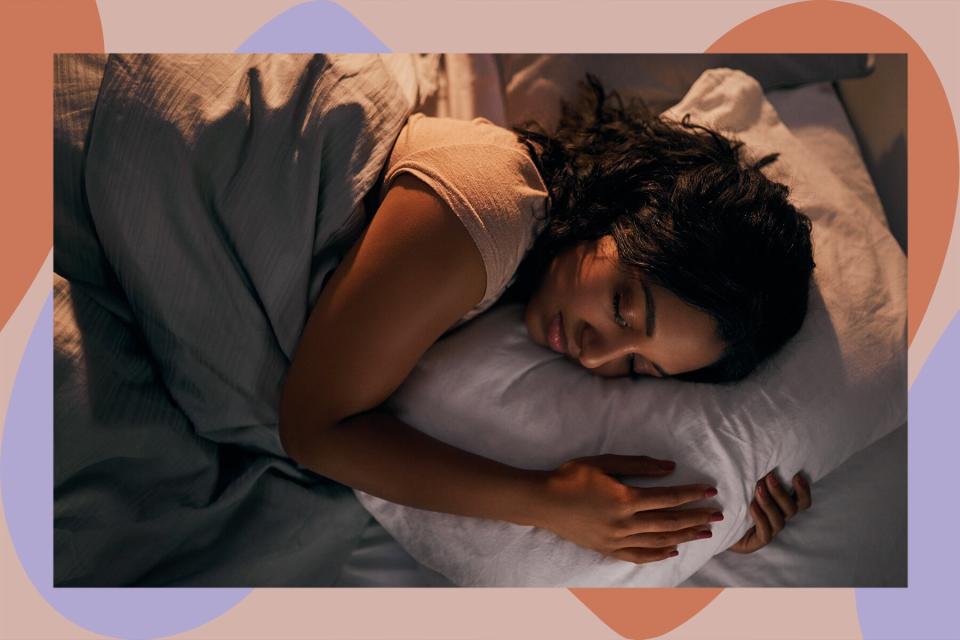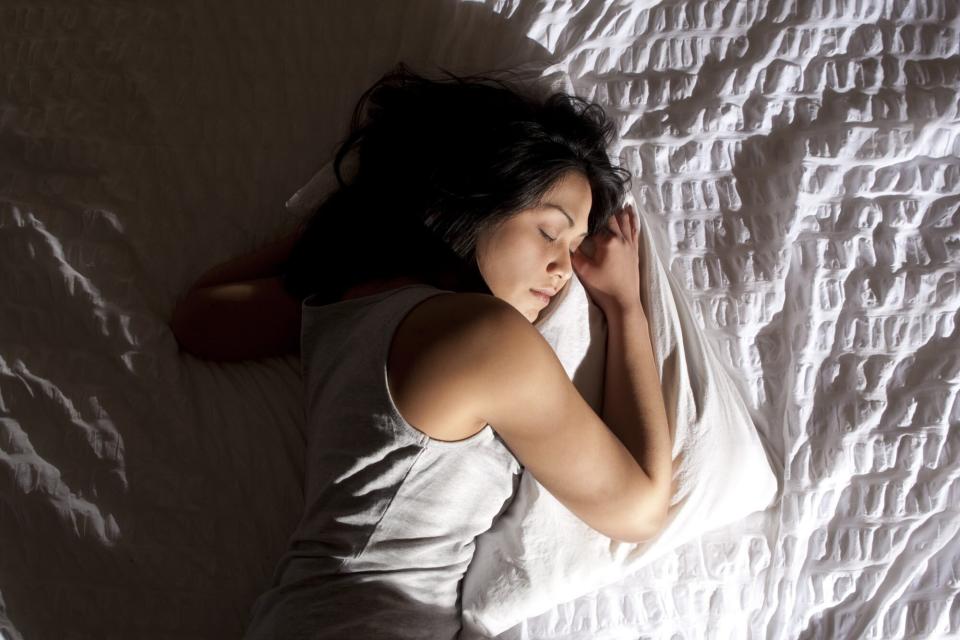Doctors Explain the 10 Major Reasons Why You Can’t Stay Asleep at Night

Getty Images
There are few things as frustrating as waking up in the middle of the night and not falling back asleep. Or worse, never falling asleep at all. Aside from feeling tired, sleep deprivation can cause a long list of concerns, like increased stress, anxiety, and depression, as well as decreased concentration, energy, and reaction times, and overall promotion of a bad mood.
If you're someone who feels anxious at night because of their seemingly irrevocable relationship with their inconsistent sleep schedule, listen up. Admittedly, there can be many causes for your inability to fall asleep, but the good news is there's hope. Rest assured (pun intended) that there are strategies to help you get a good night's sleep. But first, let's understand the causes of sleep disruption.
Why can’t I sleep at night?
1.You're using the wrong mattress and pillow.
Dr. Michael Breus, the chief sleep advisor at Purple, says a common cause for not sleeping is neck pain, shoulder pain, or lower back pain caused by the wrong pillows or mattress. "I honestly can't count the number of people who got new mattresses and pillows after we evaluated them and then had their sleep issues go away," he says. Unsupportive or uncomfortable pillows or mattress can make sleeping anything but a relaxing experience, which is not the goal.
2. You have an inconsistent sleep schedule.
If you're someone who goes to bed and wakes up at different times every day, this can disrupt your circadian rhythm—aka your internal clock—because your body never knows when to go to bed. "Our circadian rhythm controls our sleep and wake cycle," says Dr. Whitney Roban, a sleep specialist. "You'll fall asleep easier and stay asleep longer when your sleep schedules and circadian rhythms are consistent," she says.
3. You're don't have the right sleep environment.
Not creating a peaceful sleep environment will affect your quality of sleep. "Sleep environments that are too bright, loud, and hot all contribute to sleep problems," says Dr. Roban. Each of these factors has the ability to interrupt your sleep, which can contribute to sleep deprivation, excessive sleepiness, and even insomnia.
4. You don't know your chronotype.
Did you know that your natural tendency to fall asleep is influenced by genetics? This phenomenon is called your chronotype, which is how much melatonin your body produces and when it's most present in your body. This varies per person and is the reason why some people are innate night owls because their melatonin production doesn't happen until way later in the day. The same goes for early risers, who often produce melatonin at an earlier time.
Once you learn this information, you can schedule your day to be more productive and improve sleep by working with your biological clock instead of going against it. You can find out your chronotype by taking an online quiz.
5. You're drinking alcohol or caffeine too soon before bed.
Because alcohol is considered a depressant, many believe it can be a helpful sleep aid, but the truth is alcohol consumption before bed reduces our ability to get restorative sleep, says Dr. Breus. When we drink alcohol, it suppresses our ability to get REM sleep—the last stage in the sleep cycle and the point when we dream. So, even though you might have experienced quickly falling into a deep sleep post-drinks, you're just interrupting your sleep cycle later in the evening, which can decrease the quality of sleep you're getting.
Similarly, drinking too many caffeinated beverages too soon before bed makes it difficult to fall asleep because caffeine is a stimulant. It disrupts stage three in the sleep cycle (slow-wave sleep), which is responsible for us feeling refreshed and alert the next day.
6. You may have a mental health disorder.
Many mental health disorders, such as ADHD, schizophrenia, bipolar disorder, and more, can negatively affect sleep because mental and emotional health are closely linked to sleep. For example, anxiety is one of the most common disorders that cause people not to sleep at night because of overthinking and excess worry. Depression is also associated with insomnia. In fact, 75% of people who have depression have experienced insomnia. There is no clear cause as to why, however, some believe that not having healthy sleep induces the disorder.
7. You may have a sleep disorder.
If your inability to sleep is chronic, you may have a sleep disorder. Some disorders you might have heard of are insomnia (which is the persistent inability to fall or stay asleep), sleep apnea (which causes abnormal breathing during sleep), and narcolepsy (which disrupts your natural sleep-wake processes). There are several other sleep disorders, but if you suspect you might have one, seek professional help from a doctor for proper diagnosis and treatment.
8. Your naps are too long.
There's no denying naps are great, but taking too long of a nap (read: hours long) can impact your ability to fall asleep later because it disrupts your internal sleep-wake process. Try limiting naps to 30 to 90 minutes so that you wake up feeling rested without hurting your chances of sleeping later.
9. You're being exposed to blue light.
Unfortunately, scrolling through social media minutes before bedtime can seriously wreak havoc on your sleep schedule. "Your phone emits blue light, which disrupts circadian rhythms and inhibits melatonin production," says Dr. Breus. The brightness from the light tricks your mind into thinking it's daylight and the lack of melatonin prevents you from getting drowsy and falling asleep. "Also, you might inadvertently read a disturbing headline or maybe see a text about a difficult situation at work, which can cause stress and cause more trouble going to sleep," adds Dr. Breus.
10. You suffer from nightmares.
"Dreaming happens during REM sleep, and is a natural part of the sleep experience," says Dr. Jade Wu, board-certified behavioral sleep medicine specialist. While dreaming can be a pleasant part of sleeping, nightmares can be a disruption. "Nightmares may negatively affect sleep quality by making someone anxious about going to sleep, increasing heart rate, and causing other physiological arousals, thereby making it more difficult to have restful sleep," she says.
Nightmares can be triggered by a range of factors like stress, anxiety, trauma, sleep deprivation, or substance abuse. While having a nightmare once in a while is totally normal, if it's continuously affecting your ability to sleep, you might want to consult with a doctor. Frequent nightmares can be treated with medication or imagery rehearsal therapy, a form of cognitive-behavioral therapy that takes an in-depth look into your nightmares.

B2M Productions, Getty Images
Tips to get a goodnight’s sleep:
1. Create an evening routine.
Having an evening routine of activities that calm your mind and body (like drinking chamomile tea or taking a hot bath) can help signal your brain to sleep. Our brains need this signal because Dr. Roban explains that our bodies are not programmed to fall asleep instantaneously.
2. Create the right sleeping environment.
The best sleeping environment is one that's quiet, dark, and cool. Make your room a cozy cove by setting the thermostat to a comfortable temperature—65 degrees Fahrenheit is optimal. You can also try playing some relaxing music or using a pillow mist as a form of aromatherapy. Creating the right environment will make you feel more calm and relaxed just in time for bed.
- 29.00 Available at Dermstore
3. Try the 4-7-8 breathing method.
"If you get out of bed for any reason, you will want to get your heart rate back down to its sleeping rate of 60 beats or less per minute," says Dr. Breus. So, if you having trouble going to bed or going back to bed, he recommends the 4-7-8 breathing method, which is when you inhale deeply for four seconds, hold your breath for seven seconds, and exhale for eight seconds. Repeat this process for five to seven cycles. This form of deep, slow, and intentional breathing helps clear the body of stress, tension, and promotes relaxation.
4. Stop drinking caffeine in the afternoon.
If you need a cup (or two) of coffee, we get it. However, make sure you stop drinking caffeine in the afternoon so that it doesn't affect your ability to fall asleep later. According to the Journal of Clinical Sleep Medicine, caffeine consumption within six hours of bedtime can reduce your total sleep time by up to 41 minutes.
5. Make a consistent sleep schedule.
This includes both the times you go to bed and wake up. "Keeping a generally consistent sleep-wake rhythm is very important for overall sleep health," says Dr. Wu. Being consistent with your sleep schedule will make your body and mind familiar with when to unwind and relax for bed. Try waking up at the same time every day as a first step to improving your relationship with sleep (even if you didn't have a good rest the night before).
6. Listen to your body.
Everyone is different, and Dr. Wu says you may need more or less sleep than the popular eight hour rule. For example, as you age, it's common to experience changes in your circadian rhythm and as a result sleep more (or less) than you did when you were younger. "Your sleep needs may also change over time, so listen to your body and follow its rhythms," she says.
7. Seek professional help.
If you're trying to implement these tips and others, but are consistently having difficulty with your sleep and it's impairing your ability to live your life when you're awake (i.e lack of focus, dozing off involuntarily, or having trouble with your memory), seek professional help from a therapist or a doctor that specializes in sleep medicine. Finding a solution to falling asleep can take a lot of trial and error. Going to a doctor can help you determine a solution that's right for you.

 Yahoo Sport
Yahoo Sport 





































